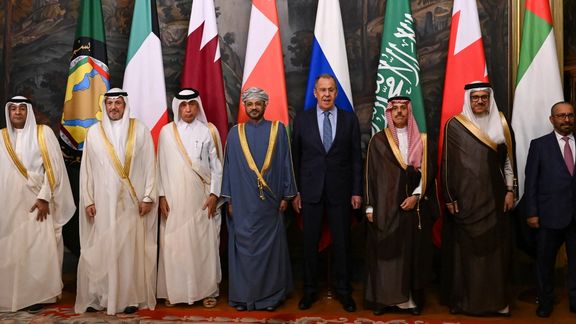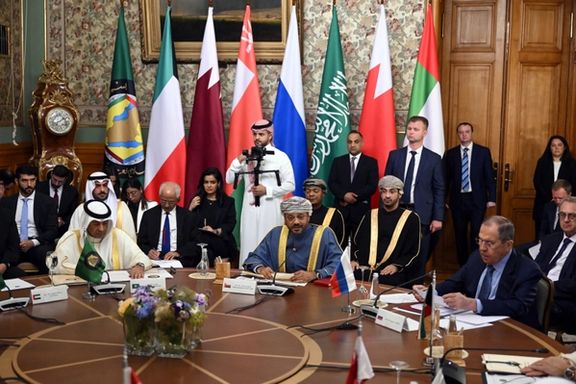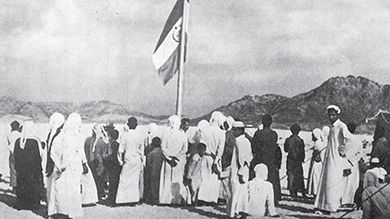Russia Sides With UAE Over Iran's Persian Gulf Islands

Tehran has upheld its sovereignty over three Persian Gulf islands after Russia and the Persian Gulf Cooperation Council (GCC) once again disputed Iran's rights.

Tehran has upheld its sovereignty over three Persian Gulf islands after Russia and the Persian Gulf Cooperation Council (GCC) once again disputed Iran's rights.
In a joint Russia-GCC statement at the sixth joint ministerial meeting of the strategic dialogue between the Persian Gulf Cooperation Council (GCC) and the Russian Federation, held in Moscow on Monday, ministers affirmed their support for the United Arab Emirates which also claims sovereignty over the islands.
A statement called for "bilateral negotiations or the International Court of Justice, in accordance with the rules of international law and the United Nations Charter, to resolve this issue is in accordance with international legitimacy".
However, Iran's foreign ministry spokesperson Nasser Kanaani, on Tuesday rejected the contents of the statement about the three islands and said they “eternally belong to Iran and such statements are inconsistent with Iran’s friendly relations with its neighbors,” referring to the detente between the Iran with its neighbors the UAE and Saudi Arabia.
The first meeting of the Russia-GCC strategic dialogue was held in the Saudi capital in 2017 but Moscow’s inclination towards the Arab countries has been on the rise in recent years, especially after the Russian invasion of Ukraine. However, the allegiance on the contentious matter of the islands with the UAE, will be a blow to Tehran which since the war in Ukraine has forged a growing alliance with Moscow.

The three Persian Gulf islands have historically been part of Iran, proof of which can be corroborated by historical and geographical documents. However, the United Arab Emirates has repeatedly laid claim to the islands, describing the situation as “the continued occupation by the Islamic Republic of Iran.”
The three islands fell under British control in 1921 but on November 30, 1971, a day after British forces left the region and just two days before the UAE was to become an official federation, Mohammad Reza Shah sent the Iranian navy to secure all three. Iranian forces remain on the islands, with only Abu Musa having a civilian population which is less than two thousand.
The GCC - a regional organization bringing together six countries of Bahrain, Qatar, Kuwait, the United Arab Emirates, Oman and Saudi Arabia - repeatedly expresses support for “the right of the State of the UAE to regain sovereignty over her three islands and over the territorial waters, the airspace, the continental shelf, and the economic zone of the three islands, as they are an integral part of the State of the United Arab Emirates.”

Urging the Islamic Republic of Iran to respond to the efforts of the UAE and the international community in solving the issue by peaceful means or taking recourse to the International Court of Justice, the GCC demands “that Iran abide by the basic pillars of promoting good neighborly ties, mutual respect, and non-interference in the internal affairs.”
In the statement issued at the end of the summit in Moscow, the Russian and GCC ministers also welcomed the agreement between Saudi Arabia and the Islamic Republic on the efforts and mediation of Oman, Iraq and China. They also expressed hope that this agreement would constitute a positive step to resolve differences and end all regional disputes through dialogue and diplomatic means.
Russian Foreign Minister Sergey Lavrov, who hosted his Arab counterparts from the Persian Gulf, also welcomed the recent rapprochement, saying that “this creates a more positive atmosphere in this region."
The GCC countries have kept warm relations with Russia after its invasion of Ukraine, despite their claims that they support the international community’s view about the war.
“Our position on the Russian-Ukrainian crisis is based on the principles of international law and the UN Charter,” Al Budaiwi said during an address to the meeting on Monday.
In March, Saudi Foreign Minister Prince Faisal bin Farhan said on a visit to Moscow that Riyadh was ready to mediate in the Russia-Ukraine conflict. Saudi Arabia has also strengthened its relationship with Kyiv, sending significant amounts of humanitarian aid, as well as mediating between Russia, the US and Ukraine on prisoner exchanges.
According to an analysis by the Carnegie Endowment for International Peace think tank, many Arabic media platforms adopt a narrative that justifies the Russian invasion with reference to Russia’s right to defend its national security. It portrays the narrative that Ukraine is a Western puppet that initiated hostilities and threatened Russia.